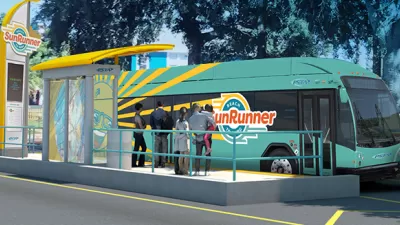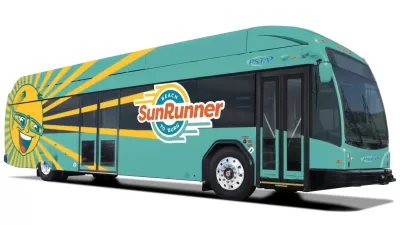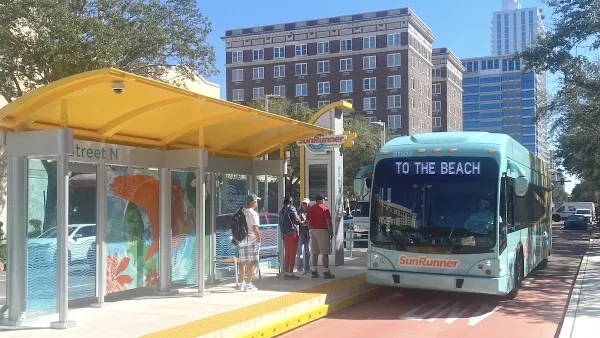The transit agency’s board voted to use all-electric buses in its planned bus rapid transit fleet, but criticism of plans to expand a freeway to accommodate the new route remain.

As reported by C.T. Bowen, “The governing board of the Tampa Bay Regional Transit Authority, known commonly by the acronym TBARTA, agreed Friday to use electric buses on the proposed transit system that is not expected to be operational until 2030.”
In prior plans, “The 41-mile route posed a challenge to running buses without a way to recharge while in service. The board agreed to a plan to install 11 charging stations at eight locations in addition to the 15 chargers needed at the overnight depot.” As Sen notes, “The earlier plan to use hybrid buses entailed 22 vehicles to run the four planned routes from State Road 54 in Pasco County to downtown Tampa and on to the city of St. Petersburg.”
Now, the agency has agreed to make all 29 buses electric. “The upfront spending on more expensive electric vehicles and charging stations will have other benefits. Calculations, compiled by a federal Transit Agency matrix, put annual environmental savings at $568,000 per electric bus, including better safety, reduced energy use and air quality benefits.”
While the agency is pushing ahead with plans to build the BRT route, “Opposition to the regional transit plan remains in Hillsborough County because of public reluctance to add additional lanes to Interstate 275 to accommodate the buses and added vehicle traffic.”
FULL STORY: Tampa Bay transit agency opts for all-electric buses on regional route

Planetizen Federal Action Tracker
A weekly monitor of how Trump’s orders and actions are impacting planners and planning in America.

Maui's Vacation Rental Debate Turns Ugly
Verbal attacks, misinformation campaigns and fistfights plague a high-stakes debate to convert thousands of vacation rentals into long-term housing.

Restaurant Patios Were a Pandemic Win — Why Were They so Hard to Keep?
Social distancing requirements and changes in travel patterns prompted cities to pilot new uses for street and sidewalk space. Then it got complicated.

In California Battle of Housing vs. Environment, Housing Just Won
A new state law significantly limits the power of CEQA, an environmental review law that served as a powerful tool for blocking new development.

Boulder Eliminates Parking Minimums Citywide
Officials estimate the cost of building a single underground parking space at up to $100,000.

Orange County, Florida Adopts Largest US “Sprawl Repair” Code
The ‘Orange Code’ seeks to rectify decades of sprawl-inducing, car-oriented development.
Urban Design for Planners 1: Software Tools
This six-course series explores essential urban design concepts using open source software and equips planners with the tools they need to participate fully in the urban design process.
Planning for Universal Design
Learn the tools for implementing Universal Design in planning regulations.
Heyer Gruel & Associates PA
JM Goldson LLC
Custer County Colorado
City of Camden Redevelopment Agency
City of Astoria
Transportation Research & Education Center (TREC) at Portland State University
Jefferson Parish Government
Camden Redevelopment Agency
City of Claremont





























